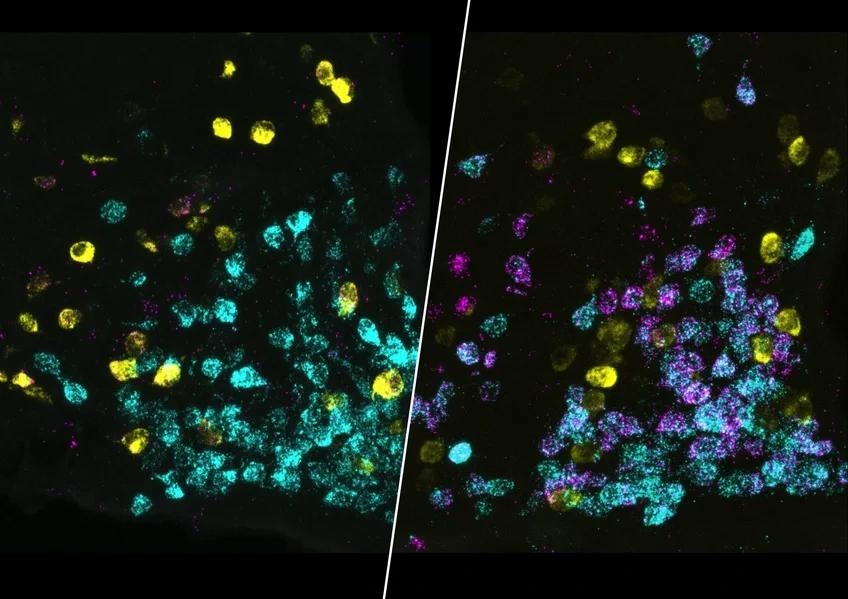Reviewed by Danielle Ellis, B.Sc.Apr 19 2023
The human body’s autophagy is triggered by fasting. The body activates the cells’ waste-removal mechanism and produces new energy. The brain plays a crucial part in this process, as researchers at the Max Planck Institute for Metabolism Research in Cologne recently found in mice.

AgRP neurons in the brain are activated by fasting. The images show immunostaining of neurons from mice that fast for four hours (right) and mice that do not fast (left). Stained are AgRP neurons (Cyan), POMC neurons (Yellow) and a marker for synaptic activity (cFOS, Magenta). Image Credit: Weiyi Chen/ Max Planck Institute for Metabolism Research
The brain causes the production of the hormone corticosterone even after a brief fast, which starts the liver’s autophagy process. The liver cells themselves were thought to be mostly to blame for this up until recently. These results could eventually make it clearer why fasting is so beneficial to the body.
Survival depends on autophagy. The cell’s own waste disposal mechanism shreds and degrades flawed or damaged molecules, and new energy is produced as a result. The body stays healthy and presumably youthful with this type of detoxification.
Until now, it was assumed that our body cells mainly themselves sense when they are low on energy and then boost autophagy. But now we have found in mice that the brain plays a crucial role."
Weiyi Chen, Study First Author and Postdoctoral Researcher, Max Planck Institute for Metabolism Research
The researchers did not feed the mice for four hours, which is when they generally eat a lot. This is equivalent to not eating breakfast; however, mice take around 40% of their food during breakfast.
They next looked at how AgRP neurons, a group of 3000 neurons in the hypothalamus, the brain’s hunger center, reacted to the fast. Surprisingly, scientists discovered that while fasting, the brain transmits signals that activate autophagy as well as signals that stimulate the organism to eat.
Brain Communicates with Liver
The researchers also discovered the mechanism through which the liver and brain interact. Low energy levels cause the nerve cells to produce the hormone corticosterone, which subsequently prompts the liver cells to activate autophagy.
Additionally, they were able to pinpoint precisely the pathways taken by the signal in the brain, allowing them to identify the specific nerve cells that took part in the process.
Additionally, they were able to show that inhibiting this signal transmission prevents autophagy from starting despite fasting. The brain is believed to send the first signal to swiftly start autophagy, according to the study. They believe that the liver’s cells would eventually begin the recycling system on their own.
Our study shows that autophagy is not only controlled in the body cells themselves, but also by the brain. In the long term, we would like to find out whether this newly discovered mechanism in the brain contributes to the positive effects of fasting.”
Jens Brüning, Study Head and Director, Max Planck Institute for Metabolism Research
Source:
Journal reference:
Chen, W., et al. (2023). Nutrient-sensing AgRP neurons relay control of liver autophagy during energy deprivation. Cell Metabolism. doi.org/10.1016/j.cmet.2023.03.019